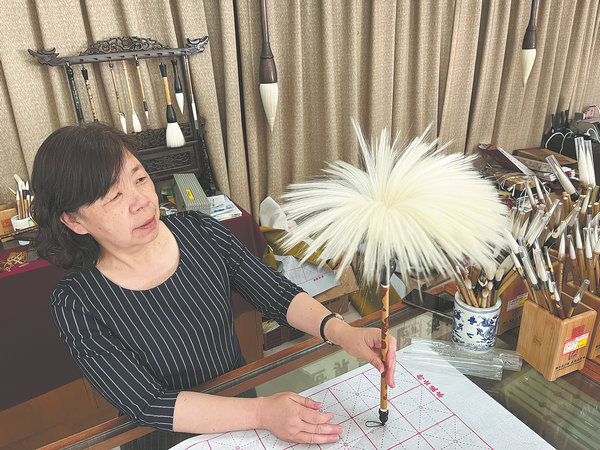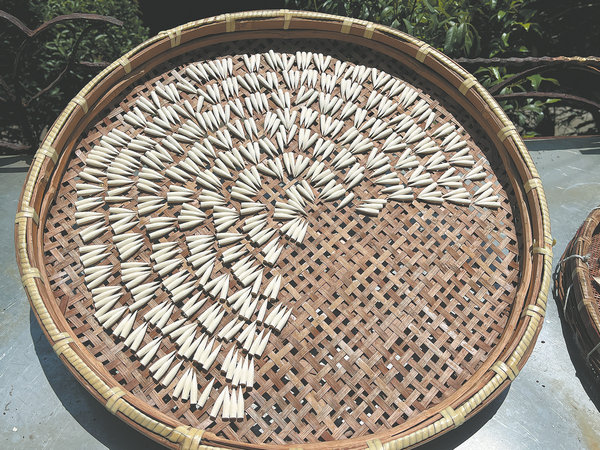

Right posture
Sitting in front of a plastic water basin in the Shanlian Huzhou Ink Brush Factory, 60-year-old Wang Xiaohua, wearing a pair of golden-rimmed presbyopic glasses, is deftly combing the small pile of wet goat wool with a bone comb in her right hand and aligning the tips, as she has done for the past 43 years. Wang Xiaohua is a provincial inheritor of Huzhou writing brush craftsmanship.
It is hard work.
"You have to sit sideways, leaning to the right as you need to transfer the strength from your whole body to your hands so that you can apply the strength deftly to avoid damaging the tips. Our hands need to be steady and strong. Besides, sitting like this won't block the natural light so that you can see the wool clearly. But sitting sideways for hours every day hurts our backs," she says.
In winter, artisans have to dip their hands into cold water frequently, so that many of them suffer from chilblains and arthritis.
"Bone combs are very sharp. If not careful, you will puncture your other hand," she says.
Wang Xiaohua grew up in the factory, since her parents worked there.
As a child, she found the woman artisans seemed happy as they talked to each other while finishing the work at hand easily. After graduating from senior middle school, she went to the factory, doing the same job as her mother did.
"Once I started, I found the work was not as easy as it looked," she says.
However, peer pressure pushed Wang Xiaohua to work harder, and as she made progress, she gradually fell in love with it.
"It's just an ordinary job, a repetitive one, but after doing it for so many years, I found this seat here is the most reassuring place for me. I've spent more time here than at home. It has become an important part of my life," she says.
When Wang Xiaohua fully mastered the skills, she understood more about writing brushes.
"It's not only a writing tool, but also closely connects with the entire history and culture of China," she says.
"It also served as a cultural bridge in global exchanges in the 1980s and '90s. The writing brush perfectly showcases the wisdom of ancient Chinese people."
In the water basin procedure, artisans dip wool in cold water, and after washing, sorting, combing and shaping, they process the wool into semifinished brushes.

After steps such as drying, bundling and inserting the brush into the hallowed end of a handle, it is Qiu's job to polish the brush, removing all substandard wool so that the brush becomes smooth and white.
The outline of a good brush should resemble that of a bamboo leaf or a bamboo shoot, depending on its size, Qiu says.
The key procedures require artisans to be extremely patient as they need to sit there for hours every day. "Not to mention that if you want to become an excellent artisan, you need to have an intuitive understanding of the work," he says.
After a seven-year apprenticeship, Qiu was able to polish goat-wool brushes of all grades. In the 1980s, he started taking apprentices. However, as the work is hard and salary low, half of his apprentices quit. Even if his apprentices did the job until retirement, they did not take any apprentice themselves, he says.
At its peak time in the 1960s and '70s, the factory saw 500 to 600 artisans producing 1.2 million writing brushes a year, most of which were exported to Japan, but now there are only 50 to 60 artisans, says 63-year-old Ma Zhiliang, head of the factory.
Now, few young people are willing to do the work, Qiu says, which is the major challenge they face about how to pass on this precious craft.
Yet, he sees hope in his apprentice, 30-year-old Yang Wen.
In September 2018, after graduating from university, Yang, who's from Gansu province, visited Shanlian, the hometown of his girlfriend, Yao Yulin. The trip kindled the young man's interest in the craft.
Besides, Yao Yulin's family owns a brush-making workshop, and her mother and grandmother are both artisans. At the suggestion of her father, the young couple decided to continue the family's brush-making business.
Later that year, after a traditional ceremony, Yang became Qiu's 11th apprentice.
"Now, the craftsmanship of Huzhou writing brushes has peaked. If we don't pass on our skills to the coming generations, the craft will not improve but only decline," Qiu says.
In addition to taking apprentices, Wang Xiaohua says that they want to get the interest of more young people through livestreams and by holding events at schools.
In terms of innovating on writing brushes, she says they are trying to mix different materials to meet different writers' needs.
Besides, the factory has become a tourist attraction for people to learn how to make a brush by visiting the workshops and polishing brushes themselves. "Sometimes, we receive as many as 150 people at a time," Wang Xiaohua says.